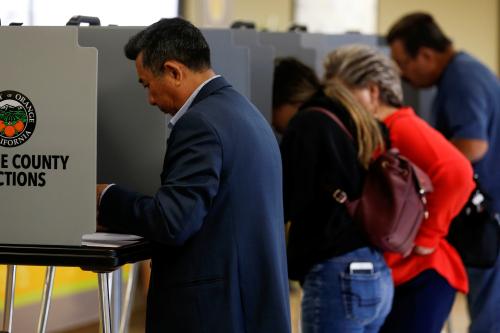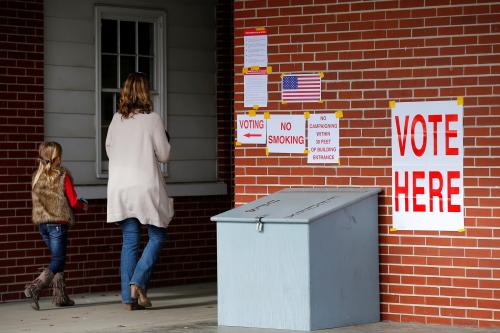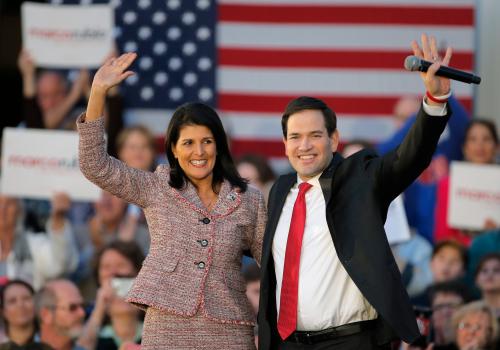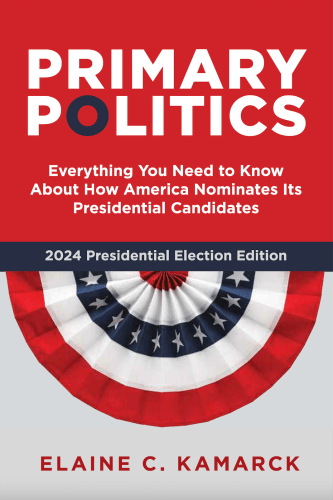The North Carolina presidential primary has had its moments. The 1976 Republican contest resurrected Gov. Ronald Reagan’s campaign against President Gerald Ford and took him all the way to the convention in Kansas City. In 2008, Sen. Barack Obama’s surprising fifteen-point victory constituted a final nail in the coffin of Sen. Hillary Clinton’s candidacy. North Carolina was also a “founding member” of the Super Tuesday club, joining nearly every other southern state to hold a primary on March 8, 1988, in a coordinated effort to put a moderate at the top of the Democratic ticket. By plumping for Al Gore, the state came through. Unfortunately for Tar Heels, others in the region chose Michael Dukakis and Rev. Jesse Jackson and the “plot” was foiled.
Otherwise the primary has been an afterthought. Given the state is an emerging battleground and now the ninth most populous, it is probably less significant than it ought to be. This is largely a function of timing. Until 2016, and with the exception of 1988 and 2004 when controversy over legislative redistricting forced the state to hold an April caucus, North Carolina’s primary was in early May, taking place well after the parties’ nominees had been determined. This year the primary is part of a national Super Tuesday on March 3, potentially important but possibly eclipsed by contests taking place in California and Texas where candidates can win many more delegates.
How will this year’s Democratic contest pan out? North Carolina Democrats, like their co-partisans across the nation, are moving to the left. But there is a strong tradition of prudent, pragmatic, and business-friendly Democratic leadership in the state. The current governor, Roy Cooper, personifies this. The Democrats here have a similarly restrained and practical view of policy, placing an emphasis on public education, infrastructure, and attracting industries and jobs to the state.
North Carolina is 22 percent Black and African-Americans make up around 45 percent of registered Democrats. But they are socially quite conservative, particularly in the east. Moreover, North Carolina has a modified primary and with no Republican contest to speak of (the GOP gubernatorial and Senate primaries are unexciting), unaffiliated voters—who now make up a third of the electorate and have shown themselves to be quite moderate—might be significant to the outcome.
Before New Hampshire, Michael Bloomberg was the only candidate with any presence in the state. He visited several cities on a handful of different visits, opening offices in places like Charlotte, Fayetteville, and Raleigh. Bloomberg also spent a lot of money, close to $10 million here on television advertising alone, driving up costs by about 25 percent. The spigot, of course, remains fully open.
Polls show Bloomberg rising. Just after the New Year, about 1-in-12 respondents said they would vote for the former New York City mayor; now he is approaching 20 percent. He seems to be picking up support from former Vice President Joe Biden, who was the choice of between 35 and 40 percent of Democrats polled towards the end of 2019.
Before his Las Vegas debate debacle and Sen. Bernie Sanders’s romp in Nevada, a Bloomberg victory seemed very possible. It might still happen. The moderate lane is wide in North Carolina—polls suggest it accounts for about 60 percent of primary voters. Alongside Bloomberg and Biden its other occupants, Sen. Amy Klobuchar and former South Bend Mayor Pete Buttigieg, are weak in the state—the latter possibly hindered by his inexperience and sexuality. The argument Bloomberg is best positioned to beat Trump has resonated within the state’s Black leadership, and he has received endorsements from just about all the state’s important mayors.
Biden could still do well in North Carolina. He has a deep reservoir of support among African-Americans and if he catches a mini-wave of momentum in neighboring South Carolina on Saturday, just three days before Tar Heels vote, he could get his nose in front. But he has not been in to the Old North State much.
Sanders is in the ascendancy and has shoved Sen. Elizabeth Warren aside in the progressive lane—which, as I inferred above, is not narrow. As elsewhere, his support is among younger, white, more liberal Democrats. Sanders is likely to do better in North Carolina than other southern states because of its large population of Yankee migrants: half of all registered Democrats were born outside the state. A victory would still be quite a coup, however. If he wins in North Carolina—and/or in Texas on March 3—Sanders can make a strong case he can succeed in the South. And 2020 might just become another chapter in the short history of meaningful North Carolina presidential primaries.









Commentary
To win North Carolina on Super Tuesday, moderates still matter
February 27, 2020